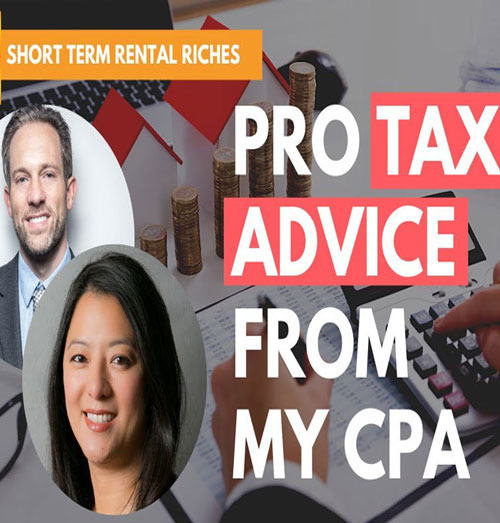In today’s episode, we’re diving deep into the world of tax strategies for short-term rental investors with the renowned Amanda Han, a real estate CPA and tax expert. If you’re in the Airbnb business, this episode is a must-watch as Amanda shares how to take advantage of the short-term rental tax loophole to offset your W-2 income, even if you don’t qualify as a real estate professional.
With over a decade of experience, Amanda has helped countless real estate investors, including myself, save thousands in taxes while building wealth through real estate tax deductions and depreciation strategies.
We also discuss critical tax updates for 2024, including changes to bonus depreciation and how it impacts your tax filings. Amanda walks us through the best practices for tracking material participation hours, which are key for audit-proofing your Airbnb business.
Whether you’re new to the short-term rental market or a seasoned pro, Amanda’s insights into real estate tax benefits could make a huge difference to your bottom line. This episode is packed with actionable tips, so get ready to take notes!
In this episode, you’ll learn:
-
Airbnb Tax Loophole: Learn how short-term rental owners can use the Airbnb tax loophole to offset W-2 income without qualifying as a real estate professional.
-
Material Participation for STRs: Understand the importance of tracking your hours to meet material participation and how it can help you save on taxes.
-
Bonus Depreciation Updates: Get the latest on bonus depreciation for real estate investors in 2024 and how to apply it to your Airbnb property.
-
Real Estate Professional Status vs Short-Term Rentals: Find out the difference between real estate professional status and material participation for short-term rentals, and how each impacts your tax savings.
-
Audit-Proof Your Airbnb Business: Amanda shares her top tips for tracking hours and expenses, so you can audit-proof your Airbnb business and avoid IRS penalties.
For more great tips, make sure to visit Amanda’s site at KeystoneCPA.com where you’ll find a free eBook on short-term rental tax strategies. And don’t forget to subscribe to this channel for more insights into real estate tax benefits, Airbnb tax deductions, and other tips to maximize your profits as a short-term rental investor!
Need help managing your short-term rental and you don’t want to go it alone? Shoot us a message here and we’ll see if we can help.
Are you enjoying the podcast? Please subscribe, leave a rating and a review, and share it! This helps us reach others that may find the info helpful as well.
You can find all of our links here including our recommended resources, short-term rental playbook, Instagram, and more!
Click here to view the transcript
Welcome to Short Term Rental Riches.
We’ll discuss investing in real estate, but with a specific focus on short term rentals.
Quick, actionable items to acquire, manage and scale your portfolio.
I’m your host, Tim Hubbard.
Well, welcome back to the Short Term Rental Riches podcast.
I’ve got a fabulous guest today.
She was actually with us, I can’t believe it, but all the way back in 2021.
Amanda Han, she is an expert in tax strategy, a CPA.
She specializes in real estate, which is right up our alley.
She’s helped thousands of people over the years, including myself.
She’s been featured on Forbes, on Money Magazine, on Bigger Pockets.
She’s an author, and her and her company do incredible work.
So welcome to the show, Amanda.
Yeah, I’m so excited to be back, Tim.
I didn’t know it was that long ago that I was here, but excited to be here.
I went back and checked the archives right before jumping on in 2021.
I can’t believe it.
Yeah, we’re in our fifth year, and time’s just flying.
And the industry, the short-term rental industry, has definitely changed a lot over those years.
And so have tax laws and all the everything that goes with that.
And so we got a lot of things that we can talk about today.
But I guess before we do that, if you could just shed some light on why it’s important for us as real estate investors to be planning out our tax strategy and some of the ways that people are using real estate to save a lot on taxes.
Yeah, you know, I think Robert Kiyosaki was the person who said this.
It’s not about how much money you make.
It’s about how much of it you actually get to keep.
And so I think for a lot of people, you know, we’re always really busy with like making money, right?
Working at your job or investing in real estate and but not really taking the time to think about, well, what is the true net result of what I’m doing?
And I think that there is a narrative that a lot of people tend to think there’s not much I can do about taxes.
It’s sort of like something that just happens to me.
I just kind of like pay it every year.
But the reality is there are a lot of things we can do to save on taxes, especially if you’re a real estate investor, especially if you are in the short term rental space.
So one of my passions is really in helping people to understand this secret, I guess, that all the wealthy people know already, which is that we can control our taxes.
And when we do control it, it really helps us to supercharge sort of our pathway to building wealth.
Yep, absolutely.
And you’ve been a huge help with me.
I don’t know how long we’ve been working together, but I guess it’s been, I don’t know, seven plus years, you know, a long time.
It’s really interesting because before coming on the podcast, I was also looking at my history, and you were one of the first clients I had in the short term rental space.
You know, now short term rental is sort of like, everybody knows about it, everyone’s talking about it.
But I think you were one of the first pioneers of like, oh yeah, I’m doing short term rental investing.
Back before, I think Airbnb was a big thing.
Yep, it’s been a while for sure.
And still going strong, still a lot of opportunity in the industry.
But of course, it doesn’t make a lot of sense if we’re making a lot of money and we give it all back in taxes.
So we did talk about a lot of great things in our last episodes.
Those were all the way back, Episode 61 and 62.
So for those of you out there, please go back and check those out.
We talked about topics there that we’re not going to talk about today, so things like 1031 exchanges, some of the benefits of filing a tax extension, personal tax, resident tax exclusions.
I don’t know if I said that right, but up to $500,000.
So there’s a lot of ways, but when it comes to real estate, there’s two main ways that people are looking at, at least for us with the short term rentals.
So we have real estate professional status and we have material participation.
Can you just rephrase those real quick for anyone out there that’s not familiar with them?
Yeah, sure.
I think I’ll just give a little bit of background on kind of like the whole real estate tax benefit realm.
As real estate investors, we get to take tax deductions like business owners do.
We get to also take depreciation, which is just the paper loss on real estate property that we buy.
And so what happens a lot is, we often see is like an investor buys a property, we get good cash flow and appreciation, but on the tax return, it’s actually showing up as a loss, right?
Because of these write-offs and depreciation.
So the question becomes, well, what happens to that loss?
What kind of income can I offset with these rental losses that I have?
And for people that are in the traditional long-term rental space, you can’t, if you make over $150,000 of income, and that’s whether you’re single or married, your rental losses no longer offset W-2 income.
We can only use it to offset income from other rental properties or other passive income we have, unless of you or your spouse is a real estate professional.
And so a couple of different rules you have to meet to be a real estate professional, one of which is you have to spend more time in real estate than your jobs.
So for most people who still work a full-time job, it’s almost impossible to spend more time in real estate than your job.
And that’s historically been like a limitation now for people who buy real estate.
They’re like, well, I love all the benefits, but I can’t use it against my W-2 income.
I really, really wanted to do that.
And so that’s where the term Short Term Rental Tax Looper was then invented.
And I don’t know if I invented this or you invented it.
You and I are like one of the original short term rental people.
But now everybody knows about it, which is great, right?
That is why we’re here, which we want to share this secret.
So the reason that we call it the short term rental tax loophole is because when you’re a short term rental investor, you actually don’t have to be a real estate professional.
You can potentially use your short term rental tax losses to offset W-2 income, regardless of how many hours you spend at your job.
We only care about whether you meet material participation hours in rental real estate.
And so to answer your question now, what is material participation?
There’s a couple of different ways to meet it.
One of which is that you and a spouse, if you’re married, spend at least 500 hours on your short term rental properties.
So if I buy a short term rental this year, I’m staging it, I’m managing it, I’m dealing with my cleaning crew or maybe I’m cleaning myself.
If I have 500 hours on my short term rental, then I can potentially use all these tax benefits against my W-2 income, regardless of how many hours I’m working full time.
And so this then becomes really beneficial for people who are like a high-income doctor or an attorney or both spouses working full time.
Short term rental is a really great way for them to buy real estate and save on taxes, and them not having to quit their job basically.
Yep.
It’s a great benefit for those of us in the short term rental world if we qualify.
And one of the things that’s happened over the last couple of years.
So yes, lots of people went out and they use this lap loophole and they bought properties, and it’s worked well for a lot of us, but there has been a few of us, or at least now more and more, that are maybe weren’t covering their tracks, they weren’t tracking their time properly, and they might be in the position where they’re getting audited now.
So if I understand correctly, the IRS increased their budget for audits by like $80 billion.
Yeah, small amount, right?
$80 billion.
I mean, who’s counting?
But yes, so IRS got a lot more funding.
And it kind of makes sense because the research shows that every dollar of increased audit results in $5 of tax revenue.
So pretty amazing.
If the government needs more money, it’s like don’t raise taxes, just audit more people.
And what we find is when there are audits, it’s not necessarily that the taxpayer is wrong.
A lot of times, it’s just like you said for documentation.
We know we did these things, but how do we prove it?
We know we spent money on some stuff for short-term rentals, but how do we prove it?
And when it comes to audit, that’s what it comes down to.
Your ability to prove that you actually did these things.
And that’s what a lot of people don’t know.
I think, like you said, people heard about the short-term rental loophole.
Everyone’s using it from your mom to your aunt, to celebrities you see on TV.
It’s like everybody loves short-term rentals, but not really taking the time to think about, okay, we mentioned 500 hours.
Did I actually spend that?
How do I prove that I actually did those things?
So I think in light of the fact that there’s more audit now, it’s even more important than before just to make sure we don’t just say we’re doing these things.
Let’s make sure we have a good way of tracking and proving all the things that we’re doing.
One of the things that’s a little scary, I guess, with the IRS is that we are guilty until proven innocent versus the norm, which is usually, we’re innocent until proven guilty.
And so we need to make sure we’re covering our basis.
Do you have some recommendations?
I think a lot of people don’t know that.
People tend to think like, well, I mean, they have to prove me wrong.
How can they prove I didn’t do this?
It’s like, well, they don’t have to.
Tax deductions are provided that you can prove those things actually occurred.
And so I think on a base level, it’s just understanding what are tax deductible items and then having a good system in place to track those things.
People always ask me, like, what do you like?
And my response is always, it’s not about what I like, it’s about what you like or your bookkeeper likes.
Because at the end of the day, it has to be a system that you enjoy doing or you’re not opposed to.
I don’t say enjoy.
Nobody enjoys bookkeeping.
It’s something you’re not super opposed to doing.
Because if you’re doing your own record keeping, it’s got to be a system easy enough, convenient enough for you to do.
QuickBooks might be really amazing because it has a lot of automations and we love it as CPAs, but if the listener is someone who doesn’t like software, doesn’t want to learn it, then QuickBooks is not for you.
You go back to Excel or a notepad, however it is that.
So it’s about setting up a system so that when money is being spent, you automatically know or have a way of tracking it.
Okay, good tips there.
And yeah, I wouldn’t say bookkeeping is necessarily my favorite part of the business, but it is necessary.
And so it’s tracking the time, as you mentioned, and I’m sure there’s some of us out there that are wondering, okay, what exactly counts towards my 500 hours or my 100 hours with material participation, whichever route they’re going?
Could you speak a little bit about some of the normal activities, and then maybe a couple that people might think they can count, but they can’t?
Yeah, love it.
So in terms of hours, like I said, if you mean material participation, then the benefit is that you get to use rental losses against W-2 and other income.
So that’s why we care about tracking hours, right?
Because if we can’t track and prove our hours and we’re audited later, then the IRS will say, no, these are just passive losses.
So you don’t get to use it against W-2 income and you’re going to pay taxes and penalties on top of that.
For material participation on short term rentals, the hours that we talk about are things that you are incurring that deal with the day-to-day operations of the property.
Sometimes we say it’s hands-on hours, but hands-on doesn’t mean you going there and swinging the hammer, you physically building the furniture.
Hands-on could mean that you are dealing with guest issues, check-ins, check-out, responding to reviews and all that, right?
Just like the day-to-day operations.
Again, you don’t have to be the one cleaning the property during turnovers, but you certainly could be the one to help schedule those people, schedule your cleaning crew and things like that.
So, it’s staging the property, getting it ready, the property management aspects of it, dealing with your crew in entirety.
Those are all good hours for material participation.
The ones that people are sometimes confused about that actually don’t qualify are what we consider investor hours.
So, investor hours would be like you learning about short-term rentals.
I want to invest in short-term rental.
I want to learn about it.
Those aren’t involved in the day-to-day operations.
So, those are typically not part of those eligible hours.
Other common ones are me attending real estate conferences, me analyzing properties, looking for new properties.
And I think an easy kind of a cheat sheet is to say, okay, this hour I’m spending, or these 30 minutes or 15 minutes, can I associate this time directly to Main Street rental, Fremont Street rental?
And if you can’t associate it with a specific property, then usually that means it’s not an eligible hour because it’s not involving the day-to-day operations of a specific property.
Gotcha, so it’s got to be tied directly to the property that you own and the one that you’re working with.
So if someone, let’s say, spent 30 hours, it’s just hypothetical, to buy Main Street, and they ended up buying Main Street and they were operating it, because it’s directly tied to that, in that situation, it’s most likely would be counted.
If you’ve been listening to the podcast for a while, then you know that I’ve been managing my properties virtually for years and years.
My team and I have managed thousands of guests.
We’ve learned a ton and I’m really happy with the progress and the growth we’ve made.
In fact, we’re now big enough to help manage your properties as well.
Our team has a ton of experience from the inner city apartment to the large lakeside retreat.
We’ve worked with all types of properties across the nation.
We’ll help to take the management workload off your plate while earning top revenue and excellent guest reviews, all while charging an industry low fee.
If you’d like to find out if your property fits with our program, just head to strriches.com.
There you’ll see a property management button.
Again, that’s strriches.com.
Just click on the property management button, and we look forward to chatting with you soon.
So usually what we would consider, and a lot of these things are kind of in the gray area, right?
Like tax law, many things are in the gray area.
I would say from the time you close on the property, a lot of those hours will count.
So I close on it, I now own it, everything should clearly count, as long as I’m involved in the day-to-day operations.
Now, prior to the acquisition, at what point?
Is it me deciding between these three properties?
Does that count?
Probably not.
If I’ve decided on the property, now I’m actually going through the act of closing.
Like I’m getting the loans, I’m signing the paperwork.
Do those hours count?
Those are probably in the gray area.
I think you could probably see an auditor arguing either way, right?
Before you buy it, is that involved in the day to day?
Probably not, but if it was the CPA making the argument, you could say, well, if I didn’t close on the property, then I could not have an actual property to buy.
So it is close enough to operational point where maybe it is part of material participation.
What we always suggest is you have to look at your risk tolerance level in terms of what should I count in these gray zones, right?
Like it’s not for sure, but maybe it could.
When we talk about using the short term rental loophole, it’s not just writing off and saving $10,000 in taxes or 15,000.
As you know, the short term rental loophole, we’re talking about saving 50,000 tax, 100,000, 200,000.
And the risk is if we’re creating these hours that either are, we can’t substantiate or are in the gray area.
And eventually if they’re thrown out for whatever reason, we want to make sure we have a good cushion of these really good hours.
You never want to be in a position where I have exactly 500 hours and because I can’t prove that one trip to the grocery store, I’m at 499 hours, I lose the whole thing and I got to pay back taxes.
So have good hours, have good documentation and we always recommend doing more than the minimum.
500 is the minimum.
If we can get to 550, good.
600, even better.
800, amazing.
Because you’re not as scared of like, wow, what if I just can’t find that email?
I can’t find that receipt.
Then it’s like things start to get thrown out.
Right.
Great advice, great advice.
So having a buffer is an excellent idea.
We don’t want to be right on the line there.
And one of the things that you mentioned there about gray areas.
So yeah, there’s some gray area on our end, but when we actually get audited, luckily I haven’t, knock on wood, you know.
But if we were to get audited, every auditor is a little different, or they could interpret things differently, right?
Could you speak to that a little bit?
Yeah, and that’s always the unknown, you know.
It’s like life is like a box of chocolate.
Right.
And that’s part of the kind of the art of dealing with auditors, you know, with the additional funding from the IRS of the $80 billion in our firm, we’ve definitely seen an uptick in audits.
Probably not surprisingly, because a lot of our clients, I mean, most of our clients are in real estate.
They’ve indicated real estate is an area they want to look into because they’re trying to target wealthy people, right?
Wealthy people must have real estate.
So I think it’s not shocking that we’ve had, we’ve seen an increase in audits within our client base.
Part of the key to dealing with an audit is getting an understanding of what the auditor is looking for and getting an idea on whether they’re open to learning.
And it might sound weird to you when I say the word learning, but, you know, we just finished an audit a couple of weeks or maybe a couple of months now ago, where I was a short-term rental investor in California.
They had a handful of rental properties in Florida and Tennessee, just different states.
And the auditor’s first reaction was after the initial meeting, they just sent an assessment like this is done.
Audit is done.
They’re paying taxes on $300,000.
And so we pushed back and said, were you going to audit anything?
Or was it just we had a conversation and you’re like, nope, this person is going to pay all the taxes.
And for this auditor, their position was, this is a short-term rental.
Short-term rentals are operated by Airbnb.
Therefore, there is no way taxpayer could have spent any hours on them.
And for us as short-term rental operators, that’s crazy, right?
Like with many Airbnbs operating.
Wish it was that easy.
Yeah.
And so from that point on, the whole purpose of the audit on our end was really to educate that auditor.
Like, what does Airbnb do?
What do they not do?
What does the client actually do?
And just kind of go through that whole process.
Because we assume the auditors have a good understanding of tax law and they know everything we do.
But that’s a great example of how they don’t.
And maybe just being the devil’s advocate, this might be someone who stayed at an Airbnb, didn’t have any issues, didn’t have to deal with the owner, and he thought everything was kind of done by Airbnb.
But when we go through and educate them, the ultimate result was really good for that specific case where they end up having a, you know, they allowed all these rental deductions once they understood the role of investor in Airbnb.
But it really could have gone another way, right?
The auditor could have been someone who’s like, nope, this is it.
And if you don’t like it, fight me in appeals or go to tax court.
That gets a little bit tricky because then, you know, we and the taxpayer have to decide, do you then want to spend the additional money to kind of fight it?
And, you know, what’s the cost benefit associated with something like that?
And that’s the piece that unfortunately is unknown in every case.
Sometimes you get a good, reasonable auditor.
Sometimes they are, you know, they feel like they are the law.
And you got to pay more money to fight a person like that.
Yeah.
And I would venture to say with 80 billion in additional funding that a lot of the auditors are probably new.
They’re probably new.
Yeah, very smart observation.
Fortunately, we have not come across that on our end, but I do have colleagues, other colleagues in the accounting world who say some of these newer auditors are a lot more difficult because they don’t know the law nor do they care to know the law, right?
It’s kind of like, this is what it is.
I did read that, you know, one of the reasons the funding was so high is they’re trying to recruit the IRS is trying to recruit people with experience because we go after more complex things, even like a short-term rental, somewhat complex.
It’s more than a 1040 tax return.
So when you audit these things, the IRS do want their plan is to hire people who have experience.
Maybe someone like me, you know, I’ve been recruited to work for the IRS.
Like, okay, you know, the strategies, you know, how people use it now help on this side and see how can we then audit them to make sure they pay the most.
And for us, we’ve dealt with a couple of people like that who used to be on the taxpayer’s end and now are in the IRS.
And we really love those people, you know, because those people, they understand the rule.
And if you’re doing everything correctly, as long as you communicate that to them, usually quick, clean audit.
So I for one, like, I love it.
I like you.
I want you to hire experienced people who understand the law or who knows how to look up the law, because that’s what we’re operating with.
We’re operating based on the law.
More so than, you know, because I say so, mentality.
Good insights there.
Okay, so a lot of good stuff here.
Let’s say someone actually does get audited and they’re working with a tax professional.
Hopefully they are.
What would you recommend?
Is it normally their tax professional that they are, you know, hiring to step in and help with the audit?
Or what does that look like?
Yeah, you know, every audit is going to be a little bit different.
So, you know, like the way we approach it in our firm is we want to know what the auditor is looking at.
So it’s typically having an initial meeting.
I usually recommend that to be the CPA and the auditor.
You know, one tip for taxpayers, if you’re audited, keep your mouth closed.
Don’t talk too much because a lot of times, even in that initial phone call, you know, they’ll be like, Tim, what do you do?
You travel the world.
Oh, great.
You hardly do real estate.
And so there’s a lot of leading questions that are asked where you might just think I’m chit chatting, but it becomes very unfavorable, right?
Later, they reference, hey, taxpayer himself said these, you know, X, Y, Z things.
So typically you want the CPA to be the first call.
And what we do is we try to figure out, like, what are they looking at?
What’s the scope?
And can we limit it?
You know, like, hey, well, Tim’s got all these things going on.
What are you really going off?
Oh, hours?
Let’s focus on hours.
And so depending on how that call goes, you know, how we kind of try to get an idea on their approach, what they’re looking at, what their personality is.
Then we typically make a recommendation to the client, you know, like, hey, there’s something pretty simple.
You could probably handle it yourself.
Or this is probably something pretty complex, could go sideways quickly.
Maybe it makes sense to hire us to do it.
So it really depends on what they’re looking for.
But I always recommend, if budget is not a concern, you have a professional help you.
Because again, you’re not in the business of dealing with audits.
It’s probably not a good idea for you to deal because you never know where the questions are going.
Yeah, great advice.
OK.
So we’ve covered quite a bit so far.
We talked about, you know, what real estate professional status was, material participation.
We talked about the IRS’s new budget and auditors and, you know, the fact that more people are getting audited.
But as long as we’re tracking our hours properly and we’re tracking all the receipts and keeping a buffer, we should be safe, assuming we’re doing everything kosher.
And so the goal with tax strategy is to pay less tax legally.
And one of the ways a lot of us as real estate investors have been able to do that is through bonus appreciation.
And that’s changed quite a bit since we talked several years ago.
So do you mind just sort of recapping bonus appreciation?
And where we’re at with that today?
Of course.
So, you know, we mentioned earlier, depreciation is one of the major tax benefits of being a real estate investor, right?
Because we can depreciate or write off the purchase price of the building over time.
So traditionally, you take a purchase price of a building, we write it off over, you know, 39 years if we’re talking about short term rentals.
But starting back in 2018, a government came out with an even better benefit.
This says for certain assets, you don’t even have to wait 39 years.
You could just write it off immediately, all in the first year.
And that’s when we, you know, you heard people say, I made $500,000 for my W-2.
I bought two short term rentals and I paid no taxes.
You know, I paid zero tax or huge refund.
It’s because of these strategies of benefits being looped on one on top of each other.
In 2024, the current bonus depreciation has gone down a little bit.
So instead of being able to take 100% bonus depreciation, we can now take 60% bonus depreciation.
So still good, but it’s just not as good as it was before.
And so the question I get a lot is, OK, well, if you can only take 60%, what happens to the other 40%?
Do we just lose it?
What does it go?
And the good news is that 40% we still get to take it.
We just have to take it over time.
So if I let’s say I bought something for $100, I get to take bonus depreciation on 60.
And then the remaining $40, I’ll take it over the next five years or seven years.
But I still get to take it, it’s just a little bit delayed than what it was back in 2021 and 2022.
Okay, so that second part, so 60, where we’re at currently, 2024, 60% in the first year.
And then the remaining 40% gets depreciated over what time frame or does it depend on the type of asset?
So the remaining 40% is depreciated over what we call the life of the asset.
So if it’s for an adjourned fixture, that’s a seven year asset, then that will go after seven years.
If it’s like I installed a pool and that’s a 15 year, then it’ll be depreciated over 15 years.
So yeah, the remaining term just depends on what is that asset that I’m talking about.
Gotcha.
Well, good stuff here, Amanda.
I’ve got another question for you.
And I of course want to make sure everyone knows where to find you.
And if they’re interested in potentially working with you guys, if you have availability where they could do that.
But before we do, do you just have any sort of, you get to see the back end on a lot of the finances, right?
I mean, you do people’s taxes.
So do you have any just thoughts on kind of the short-term rental industry?
I know we’re seeing people go to boutique hotels or sort of just overall thoughts on the industry or changes that you’ve noticed, good or bad.
Yeah, I think there’s a lot of fear with respect to short-term rental space right now has been right for a little bit of time.
And I feel like that stems from all the people who kind of jumped into short-term rental space without really understanding the business.
Because back then, we were in a time where there was almost no chance of failure.
Everybody who invested made money.
It’s just like now, it’s changed a little bit or change quite a bit.
And so it’s just to be successful in short-term rental, you have to learn the business for a lack of a better description.
But a lot of our clients, including you, a lot of people are still very aggressive in the short-term rental space.
I have clients who are super excited about the fact that there is a fear mentality for short-term rentals, because now they’re picking up properties for $700,000, whereas two years ago, it was being sold for like 1.2 million.
And we also have clients who are just like in the luxury short-term rental space.
That’s almost like a niche within a niche that are doing really, really phenomenal too.
So I think it’s kind of just like how you look at the scenario.
Some people are, most people are fearful, but a lot of the good experienced people are like, this is great, this is what I’ve been waiting for, for the last couple of years, and excited to kind of be able to come back into the game.
So those are kind of what I’m seeing.
But I love it when newer investors will tell me like, oh my gosh, short-term rental is dead, it’s so crazy, it’s so risky.
It’s like, is that just based on the media, or have you actually done any research?
Right, right.
Yeah, no, there’s a lot of Airbnb busts out there.
And we know that every real estate market is different.
And so of course, the returns with every property and every market are totally different.
And so I guess the important thing there is that there’s still a lot of opportunity, but we got to make sure the numbers add up before we pull the trigger.
Yeah.
And sometimes, you know, like that was always the case too, right?
Like that was always the case.
Even during the boom times, it was like, let’s make sure that numbers make sense before you just jump into this Airbnb just because you like it and your friends invested there.
And sometimes, you know, depending on where someone’s at in their income tax bracket, these tax strategies, buying a short-term rental that maybe is breaking even or even potentially losing a little bit could still be good in the grand scheme of things.
So it really does come down to planning and we can’t do that the day our taxes are due, can we?
Yeah.
I think that’s probably one of the most common mistakes I see people make is, you know, we always get a lot of calls like January through April.
It’s like, oh my gosh, I need to tax planning.
I’m going to owe a lot.
And unfortunately, it’s too late.
You can’t tax plan for last year, but we can plan for this year.
And if you’re planning in August or September, that’s better than planning in December.
The earlier in the year we plan, the more options we have.
We get people who scramble in November to say, hey, I need to buy a short-term rental.
I mean, I don’t know.
Maybe you’ll find a good deal.
Maybe you won’t.
But if we had that conversation in March, I think you had a lot of time to do the research and find the best properties for tax savings and also for cash flow and appreciation.
Yeah, great advice.
Don’t leave it to the last minute.
Okay, I’ve got one more question for you, Amanda.
Not related to short-term rentals or real estate or taxes.
And that is that the name of our show is Short Term Rental Riches.
And a lot of times when people hear that name or they hear the word riches, they think about that word in a financial sense.
But we know that life’s not all just about finances and riches.
So curious if you have something in your life or a habit or something you changed recently that’s enriched your life in a non-financial way.
Oh, man.
That’s a great question.
For me, I think something I’ve changed recently is trying to be more aware and appreciative of things as they occur.
And I don’t know if I saw this on a social media post or something.
People always talk about the good old days.
I remember when.
So I try to be more conscious of like, well, one day I’m going to look back and say, I remember when.
I remember when we just went on a family trip with myself, my husband, my kids, and my mom and my mother-in-law.
And I was just really trying to be aware of like, hey, this season in life is not going to be forever.
Where my kids are small enough to want to travel with me and my parents are young enough where they could still travel.
And so just try to be more aware of like, now is going to be the future.
I remember when and try to enjoy and capture that, I guess, in my mind, because we’re so busy all the time just moving from things to things.
And yes, make it more enjoyable when you’re doing it, rather than stress about mom and kids, all with me on vacation.
I love that.
Be more in the moment.
Yeah, there’s so many inputs these days, aren’t there?
And every day, I feel like there’s more, you know, emails, social media, channels, all this stuff.
Well, awesome.
I really appreciate you come back on, Amanda.
I know our audience has learned a lot from you.
Great advice.
We talked about covering your bases.
If you are trying to have the real estate status, you know, real estate professional or materially participate, there are some rules associated with that.
So you got to make sure you follow them, track them.
Hopefully you don’t get audited.
But if you do, Amanda had some great tips for that as well.
Real estate can be an amazing tax strategy, you know, for someone that’s not even in, you know, that has a totally different career.
So I appreciate all the advice.
Where can people go to learn more from you, find out about your company, all the above?
Yeah.
So my company is called Keystone CPA.
So you can go to keystonecpa.com, and we have a lot of great free resources there.
We actually have a ebook on tax strategies for short term rentals.
So we talk a lot about that specific strategy.
If you are looking for just daily tax tips, best place to find me is on Instagram as AmandaHanCPA.
And if you’re looking for a little bit more in-depth tax content, my YouTube channel is probably the best at AmandaHanCPA.
Awesome.
Well, thanks so much for coming on, Amanda.
This is great.
Yeah, thanks for having me.
Whether you’re just getting started or you have dozens of properties, one thing remains the same.
Poor management can crush your investment returns.
Our team has learned a lot managing over 40,000 guests, and we’ve compiled our biggest takeaways into a handy guidebook to help you better manage your property.
Equipped with checklists for guest verification to pricing strategies, it breaks down our whole process from start to finish.
Best of all, it’s free for you for being one of our loyal subscribers.
You can get your copy by going to strriches.com.
That’s strriches.com, and I hope it helps you earn higher returns with less headache.















